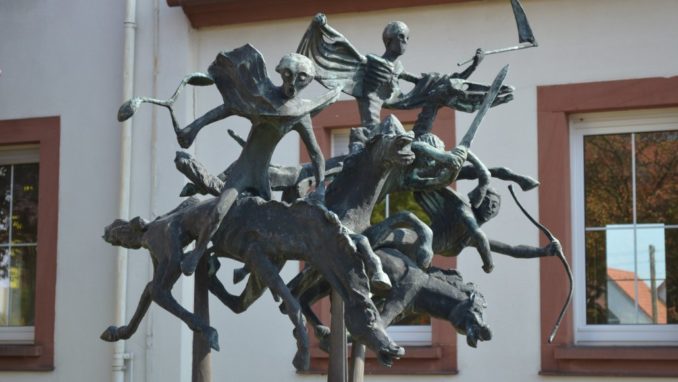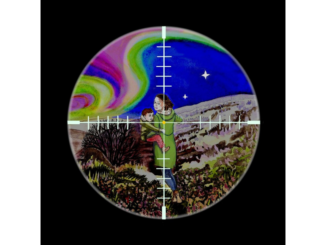
It’s not exclusive to Christianity of course; the Jews had a very imaginative genre of apocalyptic literature as can be seen from the surviving Dead Sea scrolls, as did Norse, Mayan and Greek theology most famously, albeit the latter were without hope and inherently defeatist. Christianity, taking from the Hebrew prophets such as Isaiah and Daniel, was more optimistic – after terrible trials and times, the faithful who endured would have an eternal afterlife with God, those who did not would be swept away into eternal death or worse. As I said, some cultures have a strong sense of the passing of Time to an End (telos in Greek, hence teleology).
With the vast majority of people living lives of unrelenting insecurity and hardship until very recently, one can understand the attractions of redemptive eschatology for most people, the sense that life is a test which if one passes offers salvation. Even though in advanced countries lives are longer and far more secure than ever before, the popular instinct of the ‘rightness’ of life being a trial and there being an End retains its grip for many people. Indeed, even convinced secularists have formulated their own version of it – Climate Change – which displays all the marks of previous religious cults obsessed with eschatology. One can forgive and understand the upsurge of such an obsession in Late Medieval Europe after the experience of the Back Death which killed perhaps half the population in a few years, but not modern Western Europe with its scientific prowess when faced with a virus that kills less than 1%, but even modern ‘rational enlightened’ humanity seems to need such things and to derive a vicarious thrill from them.
Jesus and End Times Prophecy
If you were to ask most people about Christian End Times prophecy they would most probably focus on the Book of Revelation as being at the core of it, perhaps as a result of having watched the Omen films. More knowledgeable people might add the books of Daniel and Isaiah alongside the Revelation of St John, as the dominant prophetic books of the Bible. The issue is that none of them are prophecies made by Jesus during His time on Earth. They were all written by prophets or an apostle.
Modern churches, even some of the early Christian churches, show a real reluctance to engage with such prophetic passages, fearing sparking End Times sects (something that has been a regular feature over the centuries), having a disdain for the vivid language and imagery which makes such books so enthralling to the average person, a fear of ‘enthusiasm’ and perhaps even more deeply, a sense that such books are a threat to the clerical order and that they themselves to be found wanting by comparison. Indeed they are – the early chapters of Revelation are not prophecies at all, but visions of Christ given to St John in which He names and shames the erring churches of the late First Century AD. The criticisms of especially the church of Laodicea can equally apply to the modern RCC and Anglican churches, and one can see why the modern churches don’t like their congregations reading these books!
The problem for modern liberal churchmen who would rather these books not be in the Bible is that they cannot be pushed to one side and ignored as being written by excitable prophets for one major reason – Jesus himself spoke about Things to Come and the End Times far more than most people realise – and of these passages covering such prophecies made by Jesus Himself, none is more important than Chapter 24 of the Gospel of St Matthews.
The latest evidence is that Matthew’s Gospel was circulating in the Eastern Mediterranean by the 60s AD, within thirty years or so of Jesus’ life when many of His first generation of followers would still be alive. It cannot be dismissed as a much later document – it’s a primary source. Matthew’s Gospel is sometimes regarded as the most ‘Jewish’ of the Gospels in its focus – it was aimed at converting the Jewish communities of the Mediterranean in language and imagery they would instinctively grasp, just as Mark and Luke’s seem to be more aimed at the Greek speaking Gentile populations.
The Content of Chapter 24
Chapters 21 to 26 cover Jesus’ final week before His arrest, trial and crucifixion – what we today called Holy Week, the week before Easter. They are a dense series of teachings and parables, but at their heart in 23 and 24 are stinging criticisms of the Jewish religious elites and then a prophetic warning of what will happen both to the contemporary Jews and later to the whole word. In my series of articles on the Old Testament prophets I pointed out how often the Hebrew prophecies have a bifold nature – covering both events in the immediate future and also in the ultimate future. It’s a characteristic ancient literary device and present here in the New Testament.
Let’s summarise the main parts of the chapter.
It opens with Jesus leaving the Temple in Jerusalem and telling his disciples that the Temple will be utterly destroyed. This of course happened with 40 years
Shortly afterwards, resting on the Mount of Olives, his disciples ask him when this will happen and what will be the signs prefiguring His Second Coming, something they assume will not be in the distant future? He starts His answer with a warning – that in the years to come many people would come forward claiming to be the Christ (or anointed one or Messiah) and that many people will be led astray, i.e. false prophets and messiahs creating new false religions and heresies.
Jesus then says there will be wars, rumours of wars, earthquakes and famines in much of the world, nothing wildly unusual here but this would the first sign warning of His Second Coming. The second sign will be a worldwide persecution of Christians, with many abandoning their faith, and yet more false prophets will emerge.
Next Jesus says the End cannot come until Christianity has ‘been preached’ in every corner of the world, perhaps something that has only happened in our lifetimes for the first time. Even North Korea now has a highly persecuted Christian minority.
Jesus goes on to say the remaining sign will a ‘desolating sacrilege’ built on the site of the Temple, currently the Al Aksa mosque, which is perhaps the greatest symbolic flashpoint between the Jews and Islam. If the mosque is the ‘desolating sacrilege’ as it surely is to Jews, then this condition precondition has been long fulfilled.
He then reiterates His warning about a plethora of false Messiahs, prophets and leaders damaging the faith, and then will come what is often known as the ‘Tribulation’, a period of years of terrible war, disease, and hardship in which vast swathes of humanity die, until the day Jesus returns ‘from the East’. Interestingly the Star announcing Jesus’ birth came from the East, followed by the Magi.
The comes a very interesting verse about the timing because Jesus says, “I say unto you that this γενος/γενη (genos/genea) – conventionally translated as ‘generation’ – will not pass away until all these things come to pass.’ Well, clearly, they haven’t – that generation have been dead for nearly two thousand years. A few verses later Jesus says he doesn’t know the date so there’s a conundrum. But the word genos has another meaning, more common in fact, it means ‘race’ or ‘people’ when translated from the ancient Greek and it is surely in this sense that Jesus uses it – Jews/Christians as a people would survive until the End Times, not be extinguished from history like most other ancient peoples and religions. It can also mean an ‘Age’ as in the ‘Christian Age’ in the way we speak of the ‘Dark Age’, again an extended period named after a distinguishing feature. Of these solutions, the former sense of ‘race’ is the stronger candidate for me, but in either sense the conundrum disappears.
Jesus next says that the sky will be darkened, the Sun’s light dim and the Moon’s obscured, as if from massive ordnance strikes, burning cities or huge volcanic eruptions. The Earth will literally start to resemble Hell, until Jesus Himself returns in power. Only God the Father knows the date, not even Jesus during His time on Earth, but that when He does return the remaining faithful will be saved to escape the final Tribulation.
The remainder of the chapter records His strictures on remaining in the faith and not assuming they could guess the time of His return.
Making Sense of It
It’s uncomfortable reading for many and many of the ‘nice’ Christians shy away from it as it seems at variance with what they prefer to think of the ‘meek and mild’ Jesus who forgives everybody and is always nice to children and puppies. But there He is saying ‘not nice’ things with His own lips. It’s a kind of intellectual and spiritual cowardice.
Jesus is describing a world turning into Hell on Earth because of Mankind’s folly, but certain things have to happen before the Second Coming can happen:
- The Temple of Jerusalem must be utterly destroyed and replaced by a building of ‘desolating sacrilege’, something utterly abhorrent to a Jew or Christian, a building celebrating evil. Well today, one of the ‘holiest’ shrines of Islam stands on the Temple’s foundations. Enough said.
- The Christian faith will have a presence in every corner of the world (something only very recently achieved) but will be persecuted widely and brutally, something increasingly common, even now getting underway in the hitherto Christian West, something unthinkable to our grandparents. Things are not yet as described by Jesus, but the direction of travel is clear.
- The lead in to His Second Coming will be marked by terrible wars and natural events, the deaths of millions, the skies filled with smoke and dust such that the light is dim. People will constantly hear of wars everywhere, something only made possible by the media and modern communications. Natural disasters will play their part too. Enough said.
- Many Christians will fall away into heresy, false religions or simply give up. Many false religious and other leaders will come along to mislead people. Well underway. The eco-cult being yet another.
Essentially these are the conditions precedent described by Jesus and it is only very recently that they are starting to come into view together for the first time in history– and they all must be achieved. They are not all here yet, but for the first time in history our species has the power to destroy life on this planet, to poison it for generations, and even in the Christian heartlands the faith is under attack like never before. And as for the rise of other false cults and faithless Christian leaders, well they are all around us. The Book of Revelation offers more specific detail of the features of the time running up to and including the Tribulation but is entirely consistent with the contents of Chapter 24, a chapter to which no Christian today should be blind.
© JD de Pavilly 2021
The Goodnight Vienna Audio file

